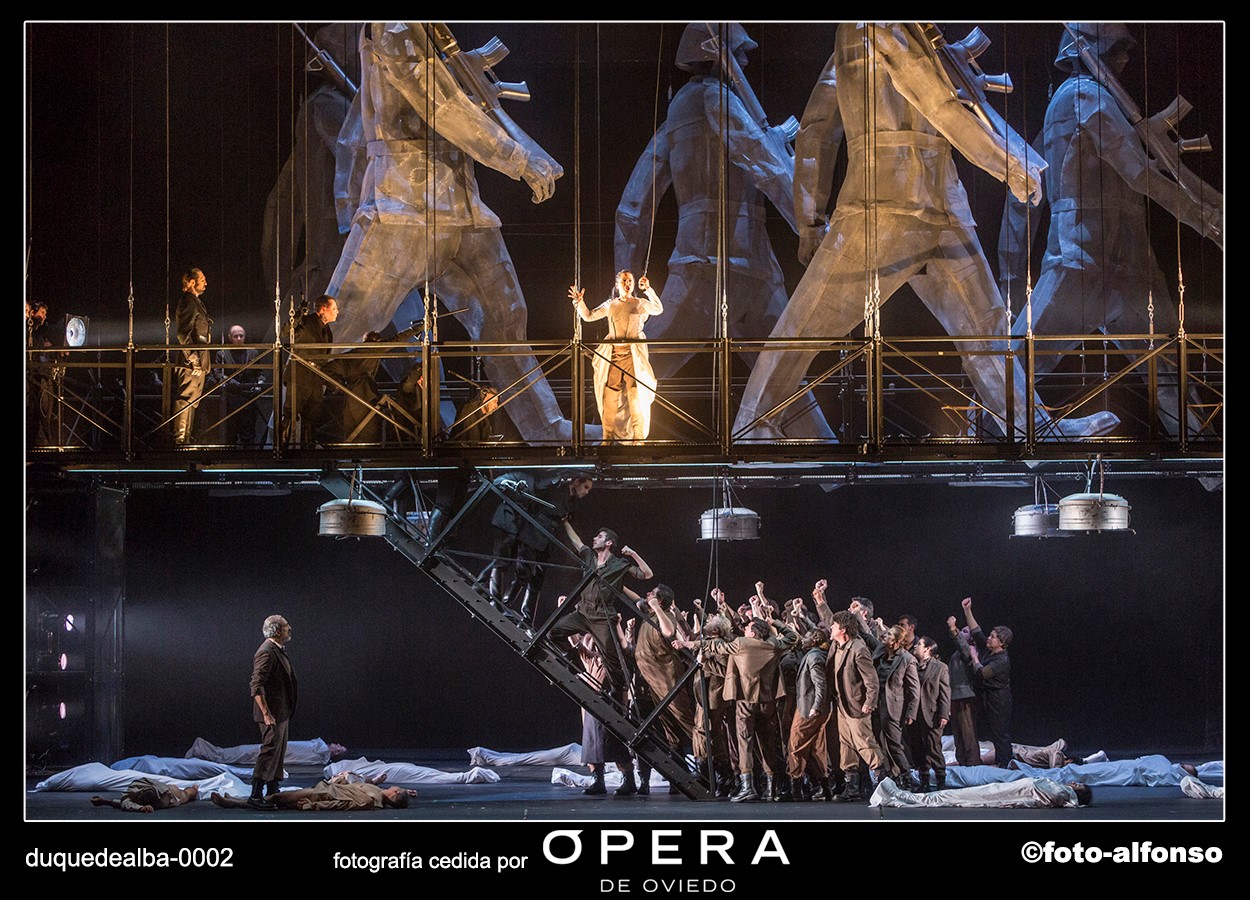 Spain Donizetti, Il Duca d’Alba: Orchestra Oviedo Filarmonia, Chorus Ópera de Oviedo, Roberto Tolomelli (conductor), Teatro Campoamor, Oviedo, 19.12.2015. (JMI)
Spain Donizetti, Il Duca d’Alba: Orchestra Oviedo Filarmonia, Chorus Ópera de Oviedo, Roberto Tolomelli (conductor), Teatro Campoamor, Oviedo, 19.12.2015. (JMI)

Donizetti, Il Duca d’Alba
Production: From Vlandeeren Opera
Direction: Carlos Wagner
Sets: Alfons Flores
Costumes: A. F. Vandevorst
Lighting: Fabrice Kebour
Cast:
Duca d’Alba: Ángel Ódena
Marcel: José Bros
Amelia: Maria Katzarava
Carlo: Josep Fadó
Sandoval: Felipe Bou
Daniele: Miguel Ángel Zapater
This opera was originally commissioned by the Paris Opera in 1839, with a French libretto by Eugene Scribe. Donizetti completed the first two acts and left some notes for the other two, completely omitting both the overture and ballet music. It seems that the famous singer Rosine Stolz, lover of the theatre’s director, was not satisfied with the plot, and it was decided to abandon the project. Donizetti recycled the tenor aria “Ange si pur” into the famous “Spirto Gentil” in the Italian version of La Favorita. Years later, after Donizetti’s death, the Paris Opera gave the libretto (with modifications) to Giuseppe Verdi, which he used for Les Vêpres Siciliennes. The Spanish invaders become French, and the Flemish patriots are now Sicilians. The plot, however, is almost identical, although dramatically the lack of the character of Procida makes the original opera less interesting.
In 1881 (33 years after Donizetti’s death), the editor Lucca got the rights to the opera and instructed Donizetti’s pupil, Matteo Salvi, to complete it with the collaboration of Ponchielli, among others. To do this an Italian translation of the French libretto was used. The aria “Ange si pur” could not be included since it was already in La Favorita, and it was replaced by a very beautiful aria by Salvi, “Angelo casto è bel.” The opera had its premiere in Rome in 1882, with Julián Gayarre in the role of Marcel. It was staged in some major opera houses but soon disappeared from the repertoire and was seldom performed.
Thus Il Duca d’Alba is not the original, unfinished opera, but rather Le Duc d’Albe, in a French translation by Matteo Salvi. This French version had its premiere three years ago in Antwerp; that stage production is now offered in Oviedo but in Italian.
I’ve tried to highlight the importance of these performances of Il Duca d’Alba in Oviedo, while recognizing that its musical value is not in line with the best Donizetti. One should also bear in mind that when it premiered in Rome, Verdi had already done the revised version of Simon Boccanegra. The difference in quality between the later Verdi operas and Il Duca d’Alba is huge, and it’s not surprising that the latter disappeared from the main repertoire.
This staging by Carlos Wagner brings the action up to modern times, which is not inappropriate ̶ invasion and the subsequent subjugation of peoples has been a constant in history. It narrates the story on a fairly simple set, and Wagner does a good job in defining the characters and moving the chorus and extras about. The stage consists of two levels separated by a metallic bridge. On the upper level are the troops of the Duke of Alba in dark uniforms, while the Flemish patriots are at the bottom in brown costumes, except for Amelia Egmont who is dressed in white. At various times large figures of soldiers appear and create the right atmosphere for the plot.
The weakest part of the performance was in the pit. I don’t think a great conductor can turn a mediocre opera into a grand one, but Roberto Tolomelli did not go beyond routine conducting. Under his baton the orchestra was fairly modest and clearly below their usual level. I found the chorus unrecognizable, and the male section was particularly poor. I don’t know if this was due to Mr. Tolomelli’s conducting or to the direction of the chorus.
Angel Ódena was the Duke of Alba, but he was unrecognizable on stage due to Carlos Wagner’s characterization. Ódena has a powerful and appropriate voice and, as is usual with him, he was much more convincing when he sang piano than when he pushed the volume.
It has been two years since I last saw José Bros on stage, and I found his Marcel very convincing. His voice has broadened and has the characteristics of a full lyric tenor, along with his usual excellent phrasing and superb diction. He sang with gusto but was a little short of brilliance in “Angelo casto è bel” where he avoided a display of high notes.
Soprano Maria Katzarava made a positive impression in the part of Amelia, the daughter of Count Egmont. Her voice has quality and is wide enough; it’s well-suited to this vindictive character.
In the secondary roles, which are quite important in this opera, Josep Fado was serviceable in the part of Carlo, while both Felipe Bou (Sandoval) and Miguel Angel Zapater (Daniele) left much to be desired.
José M. Irurzun
